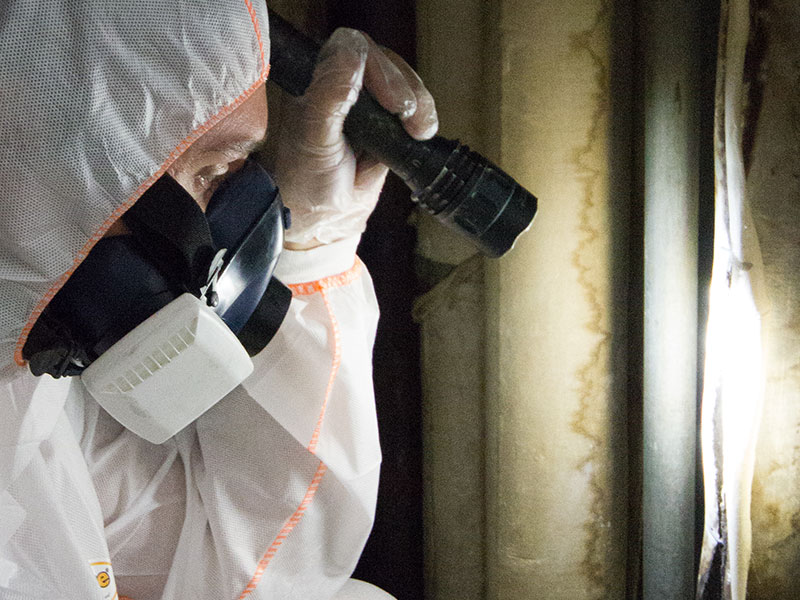7 Things to Consider After Completing Your Asbestos Non-Licensed Training
All too often we see an Asbestos Non-Licensed Operative Training course booked and no thought has been given to everything which must be considered before undertaking work on non-licensed asbestos.
This is normally because until the training is given most company’s or teams are unaware of everything which is required under the asbestos regulations. In many cases once people become aware of what is required by law, they take the decision to not undertake work on non-licensed asbestos.
In this article I am going to give some detail on the major items that are not known or are forgotten by those who have had non-licensed asbestos training. This article does not cover all of the documentation and paperwork requirements as I have recently written another article which covers this.
This is not an exhaustive list for legal compliance when it comes to working on non-licensed asbestos. However here are a few of the things to consider after your asbestos training:
- Asbestos Insurance
- Documentation Requirements – Everything
- Medical Surveillance
- Face Fit Testing & RPE
- Basic Equipment & Testing
- Disposable Materials & PPE
- Asbestos Waste & Special Waste Carriers License

Asbestos Insurance
By law all UK businesses must have suitable insurance for the work that they undertake. Asbestos work is no different. Once you have had your asbestos non-licensed training the first thing you must do is inform your insurance company that you intend to undertake asbestos work. This is something many businesses are not ready for. Insurance for work on asbestos is very expensive and the cost of this insurance premium comes as a shock to many.
If you are not insured to undertake asbestos work and you continue to do so you are breaking the law. Remember having non-licensed asbestos training is not enough by itself to make you legally compliant to undertake this type of work.
Documentation Requirements for Everything
The next item on the agenda of requirements in addition to training when working on non-licensed asbestos is appropriate documentation. During the asbestos training you will have been informed of the requirement to undertake appropriate risk assessments prior to carrying out non-asbestos work. These risk assessments must be written and must form part of the plan of work (POW). The plan of work should fully detail all elements of the work being undertaken including all associated control measures and risks.
The POW will need to be accompanied by an appropriate set of standard operating procedures (SOP’s) which also includes your company’s asbestos policy along with all procedural documentation which your newly trained asbestos team must adhere to. For more information on this subject see my recent article covering POW’s and SOP’s.
Medical Surveillance
The first item that gets mentioned during asbestos non-licensed training that comes as a surprise is the legal requirement for medical surveillance that must be undertaken on every operative that undertakes work on non-licensed asbestos materials.
It is worthy of note that this applies to NNLW – Notifiable Non-Licensed Work. It is normally the case that any work where asbestos is being worked on which is more than just very minor work will fall into this category. How to determine the difference between non-Licensed asbestos work and NNLW forms part of the asbestos non-licensed training course.
Since 30 April 2015 all workers carrying out notifiable non-licensed work (NNLW) need to have a medical examination before they start this type of work. This consists of a chest examination and a test to check lung performance. These medical examinations may be offered privately for a fee by GPs and by other medical professionals including doctors appointed by HSENI for the licensed worker’s medical examinations.
Examinations will then need to be repeated at least every three years, as long as the worker continues to do NNLW.
Have you got this in place and have you a robust record keeping system for these documents? You must if asked, be able to provide this documentation.
Face Fit Testing & RPE
After your non-licensed asbestos training you will know that correct respiratory protective equipment (RPE) and appropriate face fit testing to ensure it fits correctly is a legal requirement.
Sometimes however even though this forms part of the training it can be overlooked. RPE must have appropriate storage and must be chosen in the correct way in accordance with RPE guidance. Face fit testing should be refreshed every 12 months.
Certificates of face fit testing must be available for inspection. In addition, and in accordance with relevant approved codes of practice RPE checks must be undertaken at regular intervals and be recorded. This all forms part of the company’s standard operating procedures.
Basic Equipment & Testing
Depending on the work you will be undertaking after your non-licensed asbestos training there is a variety of basic equipment that may be required. For almost all asbestos work “H” type vacuum cleaners will be required. These can be hired or owned. Either way they must be appropriately sealed for transit when not in use and must have in date testing and maintenance certificates. The maintenance certificates include the testing of the HEPA filters (DOP) and usual electrical PAT testing. All testing of this nature must be renewed every 6 months as a minimum.
When you have your non-licensed asbestos training you may have specific training for certain elements of non-licensed asbestos. If you have specific training for large areas of asbestos textured coating and or large quantities of asbestos cement sheeting, then there will be a requirement for other asbestos equipment.
Some of the equipment you may need could be negative pressure units (NPU’s) and or large airless sprayers for fibre suppression. Again, any of this equipment will need routine certified maintenance documentation which must be updated regularly and be available for inspection.
Specialist equipment and its strict testing regime is another reason why some who have had asbestos non-licensed training decide not to do the work themselves and leave it to asbestos professionals.
Disposable Materials & PPE
During your asbestos training you will be introduced to many different disposable materials and personal protective equipment. Some of the items that you will need are:
- Asbestos disposabe overalls
- Disposable underwear / boxer shorts and socks
- Asbestos waste sacks
- Heavy duty virgin polythene
- Cloth tape
- Barrier tape
- Spray Tak
- Tak Rags
- Disposable towels
- RPE Filters
- NPU Filters
The list really does go on and on. There is numerous types of materials and sundries that are required to safely undertake work on non-licensed asbestos. All materials and disposable items must conform the relevant British Standard and be appropriately demarcated for asbestos where relevant. A lot of these items are only available from specialist suppliers, and all come at a premium.
Asbestos Waste & Special Waste Carriers License
One of the most forgotten items which tends to be underestimated when asbestos non licensed training has been completed is the asbestos waste element. By far the easiest solution will always be a bespoke asbestos waste container delivered and collected by a certified asbestos waste company.
However, a majority of small non-licensed asbestos works would not require an asbestos waste container. This can be a challenge. If you are looking to transport the waste to an appropriate asbestos waste site yourself then you must comply with the relevant waste and carriage regulations. You will be required to have a special waste carriers license which must be obtained from the Environment Agency. In addition, you must transport the waste safely and this may require specialist changes to your vehicles. The other option is to use an asbestos waste collection company. However, this type of asbestos waste collection can be very expensive.
Conclusion
For those considering having or for those who have just had non-licensed asbestos training there is a lot more to undertaking asbestos non-licensed work safely and in accordance with asbestos regulations than just the training itself.
These things sometimes get overlooked and can create big challenges. We have a full range of packages to help you put together everything you need for full compliance. Speak to a member of the team now for full information and find out how we can help.

Written by Jess Scott
Jess Scott has been an all-round asbestos consultant since 1996. That’s nearly 3 decades of asbestos knowledge. He spends his time sharing that knowledge with the team at Oracle and with their clients. Jess's goal is, and always has been, to use my expertise in helping people to comply with the law. This legal compliance ultimately helps to protect everyone from the harmful effects of asbestos. Jess has acted as an asbestos expert witness in legal cases and is involved in many asbestos educational activities throughout the UK.
